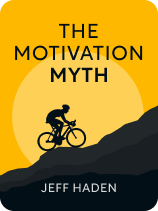

This article is an excerpt from the Shortform book guide to "The Motivation Myth" by Jeff Haden. Shortform has the world's best summaries and analyses of books you should be reading.
Like this article? Sign up for a free trial here.
How can you develop resilience? How is resilience instrumental on the path to success?
Repetition and incremental improvement aren’t enough to keep you going when you’re striving to achieve your goals. Therefore, it’s important to develop resilience, which Jeff Haden’s book The Motivation Myth defines as the ability to persevere through difficulties and disappointments.
Continue reading to learn how to develop resilience to stay motivated.
Building Resilience
Resilience doesn’t come from being stronger, smarter, or more energetic but from learning to make the most effective use of the abilities you already have. Haden gives two specific suggestions for efficiently learning how to develop resilience:
- Conserve your resources by saying no to things that distract from your goal.
- Dedicate an entire day to focusing your efforts on one specific task.
In general, though, resilience (like motivation) is a mental construct that arises from making a deliberate choice to ignore distractions and focus on your goal.
(Shortform note: In addition to helping you overcome hard times and disappointments, resilience is also necessary to overcome a third productivity killer—boredom. In Atomic Habits, James Clear warns that boredom is a natural side effect of skill-building repetition, a cycle in which the activities that once excited and challenged you eventually become routine. Once this happens, boredom can test your resilience just as much as fatigue, so you should keep ramping up the difficulty level of your program so that whatever skill you’re practicing remains slightly beyond your current abilities. For instance, if you’re working out with weights, gradually increase your number of reps or the amount of weight that you’re lifting so it can remain a challenge.)
1. The Power of No
Saying no to yourself is hard, and saying no to other people and external commitments can sometimes be even harder. To stay resiliently focused on the tasks and goals that matter most, evaluate anything that diverts your time and energy by whether it serves your primary goal. This includes your habitual distractions, work obligations, and even opportunities that may look appealing but are wasteful in the long run.
One tool that Haden provides to strengthen your resilience against losing focus is to reframe “I can’t” statements as “I don’t.” For example, if you’re spending an afternoon making calls to build your client base (toward your goal of being a freelance public speaker) and you’re frequently tempted to quit this task early, don’t tell yourself “I can’t stop until I’ve made my daily quota.” Say instead, “I don’t stop until I’ve made my daily quota.” The word “can’t” opens the door to resentment—as if the stated task was imposed from outside—while leaving room to negotiate with yourself. Rephrasing as “I don’t” makes completing the task a part of who you are and has been shown to bolster resilience and motivation.
Setting up boundaries at work is also vital. Odds are that you spend a great deal of time not focusing on the tasks that you’re best at or pushing yourself forward to your goal. If you’re already a high achiever, this is likely because you’ve said “yes” too often and have taught your colleagues that you’re always available. Haden suggests dialing back on this habit so that the people you work with won’t use you as a crutch. Don’t be afraid to deflect and delegate jobs that don’t support your main goals. Setting boundaries isn’t dismissive—to the contrary, it can foster productive relationships and help your colleagues to be more self-reliant.
This also involves saying no to things that may seem like opportunities at first glance, such as a request to mentor someone, plan a party, or accept additional work responsibilities. Haden argues that you should look at each offer and ask if it will help you on your way to your goal and if it will do so better than the plan you’re following now. If the answer is no, then as much as it pains you in the short term, turning down an opportunity can be a choice that saves energy and time.
2. Productivity Marathon
Another way to make the most of your resilience is to occasionally concentrate your efforts in a day-long session to complete a major task toward your goal. A work marathon (or, in Haden’s words, an “extreme productivity day”) can knock a major step off your to-do list, motivating you to keep moving toward your goal while reducing the need for resilience by completely shutting out distractions. Haden lists steps for setting up a marathon session, how to stay energized and focused, and how to apply similar principles to an entire week or more.
First, it’s vital to let people know you’re going to be unavailable. Schedule your concentration time as you would on a vacation and dedicate yourself to working those hours. Also, make sure to book a long stretch of time. Haden says that spending long hours on a task is paradoxically easier since it frees you from having to monitor your schedule. He also suggests not beginning your marathon at the same time you’d normally start work. This session is meant to be a break from your habits, and one way to make sure that happens is to break from your routine. Also, by accomplishing more in a day than you normally would over several, a marathon recalibrates your expectations of how hard or how much you can accomplish at once.
While embarking on your productivity marathon, you balance taking care of your mental and physical energy needs with not letting yourself drift too far off task. Haden suggests eating snacks before you’re hungry and getting up to stretch your muscles before you start to feel tired. By the time your body sends you those signals, its reserves are already flagging.
However, Haden also says to delay taking breaks (to reward your progress) longer than you normally would and to stop work in the middle of a task so that you know exactly where to pick up when you start going again.

———End of Preview———
Like what you just read? Read the rest of the world's best book summary and analysis of Jeff Haden's "The Motivation Myth" at Shortform.
Here's what you'll find in our full The Motivation Myth summary:
- Why you should stop waiting for motivation to hit and instead, make your own
- How to create a cycle of positive reinforcement to boost your motivation
- How to develop resilience to get through times of struggle






